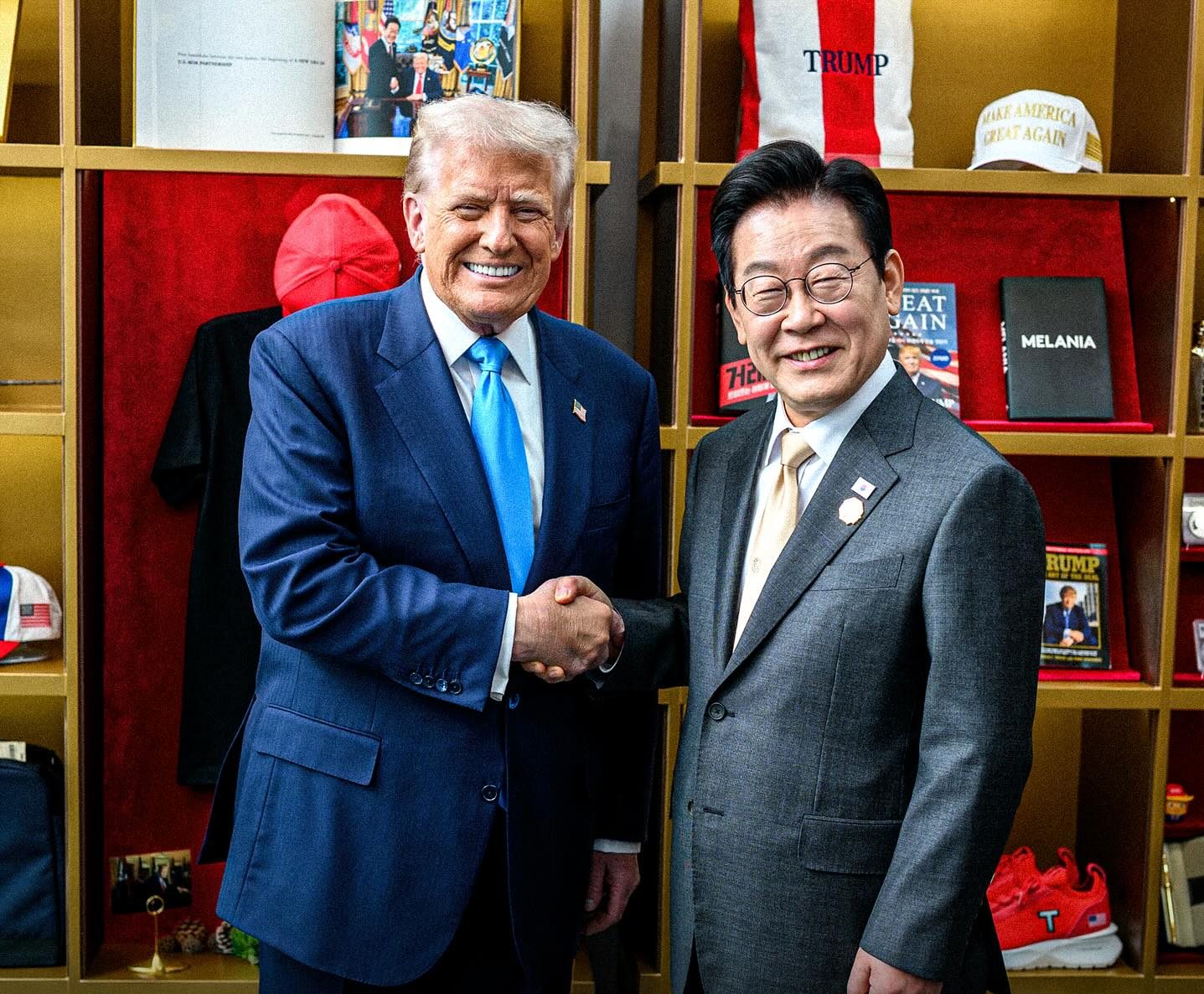President Trump Finalizes $350 Billion Trade and Investment Deal with South Korea — Then Receives the Nation’s Highest Honor in a Historic Visit
President Trump Finalizes $350B Trade Deal with South Korea
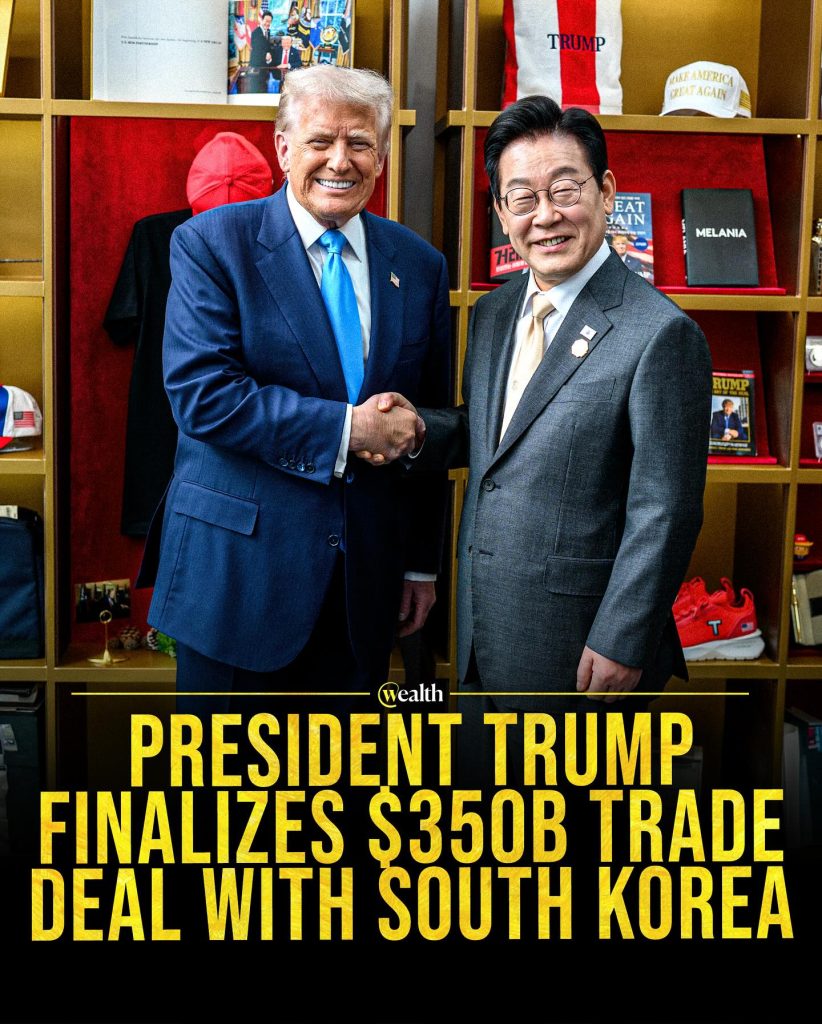
There are moments in diplomacy that feel bigger than policy — they feel like history.
In late October 2025, President Donald Trump landed in South Korea’s cultural heart of Gyeongju for what would become one of the defining visits of his second term. The air was tense yet hopeful as negotiators worked around the clock to finalize an economic agreement that had been in the making for months.
When the deal was signed, the number alone stunned observers — nearly $350 billion in planned Korean investment into U.S. industries, from semiconductors and shipbuilding to next-generation energy technology. In exchange, Washington agreed to lower tariffs on Korean autos and components to roughly 15 percent, opening a new chapter in one of America’s most valuable alliances.
Trump, ever the dealmaker, called it “a win for American workers, a win for Korean innovation, and a win for global stability.” Behind closed doors, aides described his energy as unmistakable — sharp, focused, and confident, the same negotiating posture that had defined his earlier administration.
Economic analysts were quick to point out that this pact could generate hundreds of thousands of American jobs and deepen cooperation between two of the world’s most technologically advanced nations. But for Trump, this wasn’t just about numbers. He saw it as proof that “America First” could also mean America and its allies first — together.
President Trump Was Honored with a Gold Crown and the Grand Order of Mugunghwa
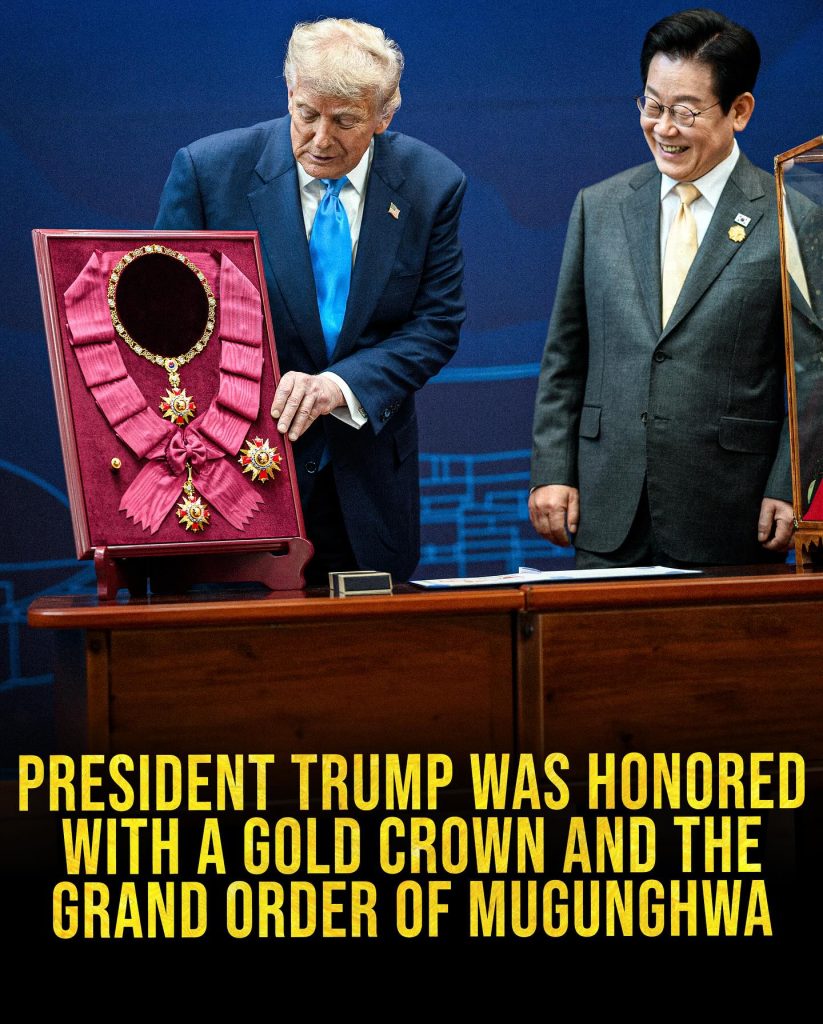
After the signing ceremony, the atmosphere turned from business to something deeply ceremonial.
Inside the National Museum of Gyeongju, under the soft gold glow of ancient relics, South Korea’s President Lee Jae-myung presented Donald Trump with two symbolic gifts — a replica of the Silla gold crown, an artifact of Korea’s royal past, and the Grand Order of Mugunghwa, the nation’s highest order of merit.
The audience applauded as the medal was placed around Trump’s neck — an honor reserved for heads of state and monarchs, but never before granted to an American leader. The symbolism was striking. The crown represented wisdom and endurance; the Mugunghwa, Korea’s national flower, symbolized resilience and rebirth. Together they framed a moment that transcended politics.
Reporters noted that Trump appeared visibly moved. He thanked the Korean people for their hospitality and spoke about the “bond of courage and friendship” between the two nations. Later that evening, during a private dinner hosted by the First Lady of Korea, An Hye-won, the conversation reportedly turned personal — to family, to faith, and to legacy.
Even those who have followed Trump for years said the emotion of that night was genuine. For a man often portrayed as combative, there was a quiet pride in his tone — the pride of being recognized not just as a politician, but as a statesman who had strengthened a crucial friendship in Asia.
It’s South Korea’s Highest Civilian Award and the First Time It’s Been Given to an American President
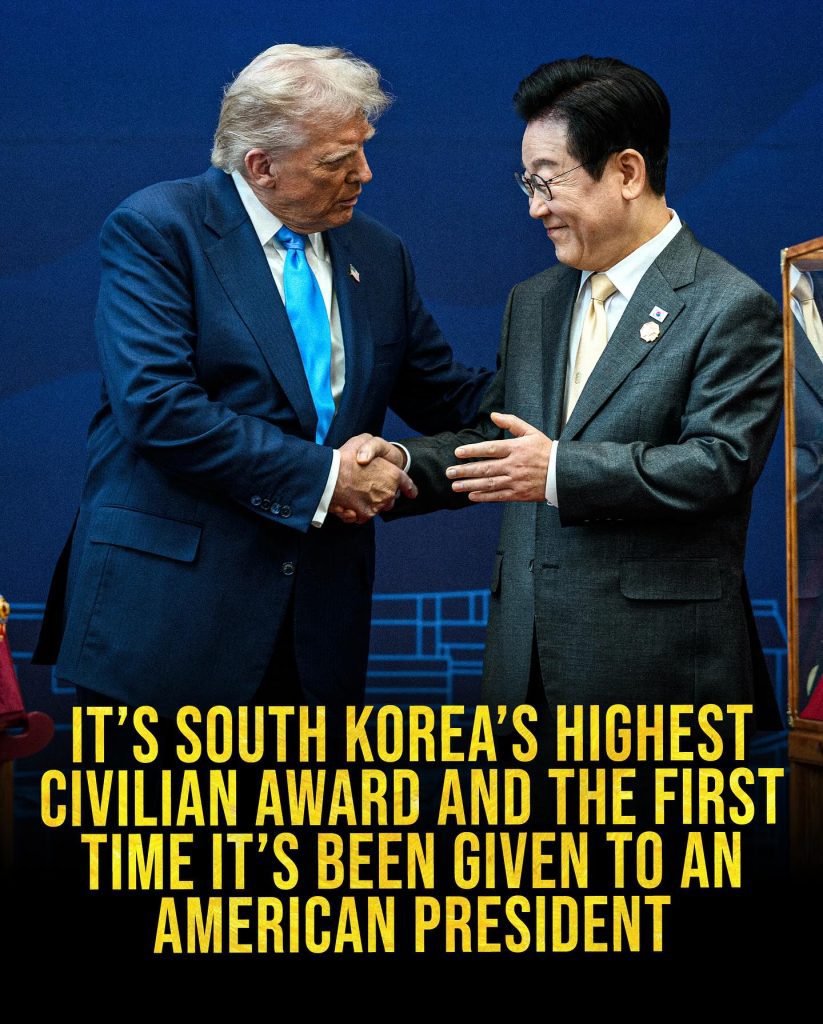
The Grand Order of Mugunghwa is not given lightly. Historically, it’s bestowed only upon sitting presidents and royalty, a symbol of supreme respect. For South Korea to extend it to an American leader was nothing short of extraordinary.
Korean media called it “a once-in-a-generation gesture,” highlighting the deep personal rapport Trump built with Seoul’s leadership. In diplomatic circles, it was seen as acknowledgment that his tough-minded negotiation style had not hurt the alliance — it had revitalized it.
The White House later confirmed that the medal will be displayed in the Oval Office beside photos of past summits and a small replica of the Apollo 11 plaque that reads, “We came in peace for all mankind.” To Trump, aides said, it serves as a reminder that peace is secured not through weakness but through respect.
Economically, the partnership is already showing ripple effects. Korean companies like Samsung, Hyundai, and SK Group have announced major U.S. expansions in Texas, Georgia, and Ohio. Meanwhile, American firms are deepening joint ventures in robotics, aerospace, and clean-energy storage — industries expected to define the next decade.
One Korean newspaper headline summed it up best: “A Medal for the Past, an Investment for the Future.”
“The Republic of Korea Is a Cherished American Friend and a Close Ally.” — President Trump
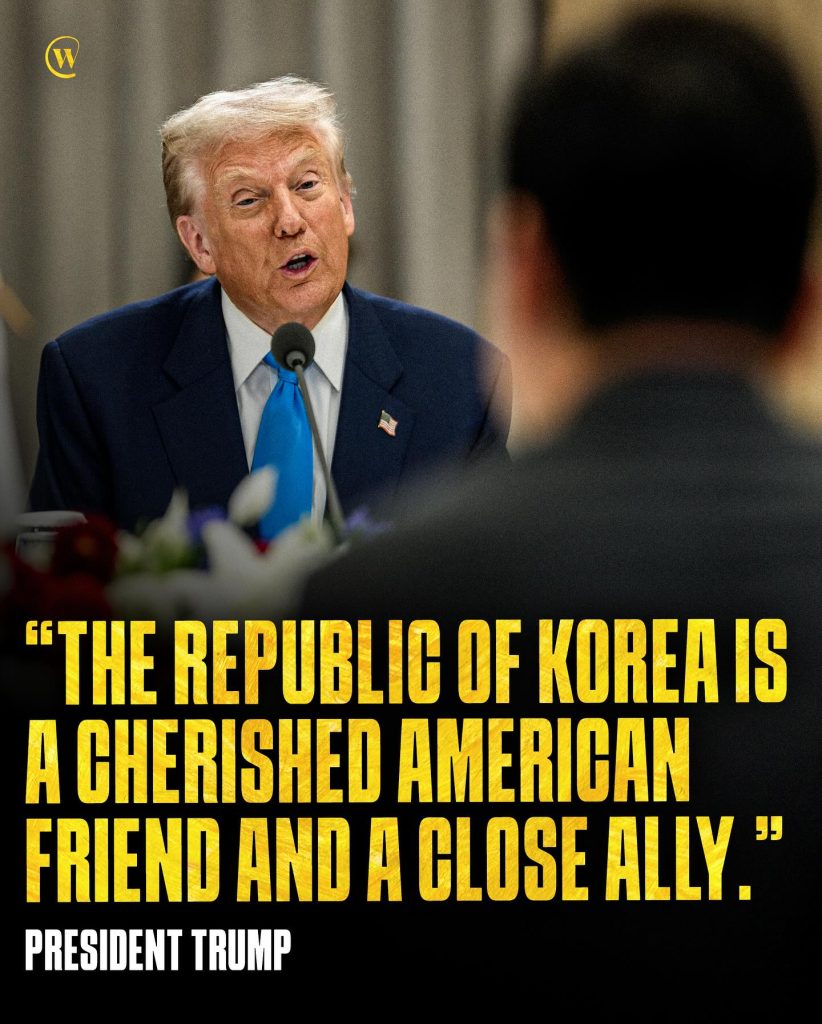
On the final day of his visit, President Trump stood before reporters at a joint press event in Seoul. Cameras flashed as he spoke in a calm, measured tone — not the campaign firebrand, but the leader reflecting on years of diplomacy.
“The Republic of Korea,” he said, pausing for emphasis, “is a cherished American friend and a close ally. Together, we will continue to build a future of strength, prosperity, and peace.”
The words resonated beyond the press room. Social media lit up with clips of the statement, and both American and Korean citizens shared messages of appreciation and pride.
For South Korea, the moment reaffirmed its place as one of America’s most trusted partners in Asia. For the United States, it symbolized a resurgence of old-fashioned alliance-building in an era of rapid change.
Behind the scenes, the President’s staff described a leader in high spirits. After the ceremony, Trump and First Lady Melania Trump were seen touring the Bulguksa Temple grounds, stopping briefly to speak with children waving American and Korean flags. “They love him here,” one aide remarked. “It’s incredible to see.”
In Washington, reactions were swift. Lawmakers from both parties acknowledged the significance of the deal, calling it a “major diplomatic victory” and a sign that economic nationalism and international cooperation can coexist. Supporters praised the President for securing tangible results; even skeptics conceded that the optics of the trip — and the scale of the investments — were undeniable.
When Air Force One lifted off from Seoul that evening, it carried more than just the delegation. It carried a message: that strategic partnerships still matter, and that the art of the deal remains a powerful American export.
Back home, Trump’s team released a statement thanking the people of South Korea “for their generosity, vision, and commitment to friendship.” The statement ended with his signature optimism: “America’s best days are ahead — and so are Korea’s.”
The trip was brief, but its impact is likely to last for decades. Economic cooperation, cultural respect, and mutual admiration were all on display. And as history has often shown, it’s moments like these — quiet, ceremonial, heartfelt — that define not just a presidency, but a legacy.
From the trade tables of Gyeongju to the glittering medal ceremony in Seoul, the visit of October 2025 may be remembered as more than a diplomatic milestone. It was, at its core, a story about trust — between two nations, and between two leaders who believed that allies could still win together.

